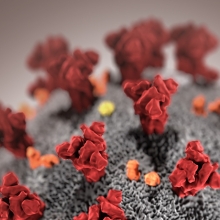Dr. Daniel Andreae and Dr. Ivo Spiegel
A partnership to advance brain science
People behind the science

Dr. Dan Andreae (left) and Dr. Ivo Spiegel
When Dr. Ivo Spiegel began setting up his lab in the Department of Neurobiology at the Weizmann Institute after he was recruited last year following a postdoctoral fellowship at Harvard Medical School, he was eager to get to work on his central research question, an age-old quandary in brain science: To what extent do experience and environment dictate brain function, and to what extent do our genes do so?
In hiring new scientists, the Weizmann Institute commits to funding all the start-up costs needed to establish their new labs. Very often, supporters step forward with funding these start-up needs. In Dr. Spiegel’s case, Dr. Daniel C. Andreae of Toronto—whose life’s work has been dedicated to education and psychology, including improving the lives of people with neurodegenerative diseases—made a generous gift to cover the costs. Since then, the two have found common ground on the scientific subject closest to both their hearts: how the brain functions, and malfunctions, in health and disease.
Dr. Andreae is a professor of psychology at the University of Guelph-Humber in Toronto and an adjunct associate professor and Fellow at Renison University College, University of Waterloo in Social Development Studies specializing in health. One of his interests is in sleep disorders. He has a doctorate in education from the University of Toronto and also holds a doctorate specializing in neuroscience.
Dr. Andreae says it was when he was serving as Executive Director of the Alzheimer Society of Toronto that he first heard about the Weizmann Institute of Science and its prowess in neuroscience. He decided he wanted to support the “excellent work” of the Institute in an aspect of brain science and visited the campus for the first time to attend the Annual General Meeting of the Board in 2015.
“A person has to go there to experience it and to understand what it is all about,” says Dr. Andreae. “What impressed me, above and beyond the beauty of the campus, was the culture of collaboration and excellence, the freedom of exploration that is given to the scientists, and the scientists’ passion and enthusiasm.”
He then decided to support a lab; when he learned of Dr. Spiegel’s ground-breaking research knew he had found his answer.
Exploring nature versus nurture
Dr. Spiegel investigates the cortex, a brain area responsible for sensory processing and memory storage, and which is home to a diverse population of neurons, each with its own distinct function in the circuit. His particular focus is the balance between the activity of excitatory neurons—which receive electric input and generate a stimulating output for connected neurons—and inhibitory neurons, which do the exact opposite: transmit to their connected neurons a signal that opposes the currents coming from the excitatory neurons. The tight control over this so-called E/I balance in the face of changing sensory experiences is critically important for normal brain function. Genetic mutations that affect synapses and lead to changes in E/I balance have been linked to psychiatric disorders such as autism and schizophrenia.
Dr. Spiegel has identified a feature embedded in the genome that regulates the amount of excitation and inhibition impinging onto a given neuron—and thus helps maintain regular brain function. He also identified a number of chemicals known as “secreted growth factors” that are expressed in subsets of cortical neurons when a person has a sensory experience. These growth factors, he found, play a critical role in adapting the neural circuits tasked with specific behaviors to experiences.
Dr. Spiegel’s work “immediately resonated with me when I heard about it,” said Dr. Andreae. Today he serves as a Patron of the Alzheimer Association of Toronto and the Honorary Chair of the Council on Brain Injury, among other roles.
The new relationship between Dr. Andreae and Dr. Spiegel has led to widening the circle of Weizmann friends in Canada. In June, Dr. Andreae hosted two events—one in Toronto and one in Montreal—in which Dr. Spiegel spoke about his research area and Dr. Andreae led a panel discussion with other professionals and leaders in the community.
“The events were very successful and opened up stimulating discussions about the theme ‘nature versus nurture’, which intrigues many people—and has implications for disease,” says Dr. Andreae.
“I and my colleagues in my lab appreciate Dan’s support very much,” says Dr. Spiegel. “Not only does it help us tremendously in setting up the lab, but it is very important for us to know that we have supportive and interested friends in Canada and elsewhere in the world. In my view, scientists ideally don’t work in isolation but instead are strongly connected to a community to which they explain their research and its impact and benefits. Having Dan interested in and excited by our work therefore means a lot to us.”
Dr. Andreae has also given to the Israel National Postdoctoral Program for Advancing Women in Science, and is supporting a neuroscience conference at the Institute. He has received many honors for his leadership and philanthropy, including Professional of the Year by the international association Who’s Who. He was inducted into the Weizmann Institute’s President’s Circle in 2016 at the Institute’s Global Gathering in London, which he calls “a truly remarkable experience in which I met other people who were equally passionate about the Weizmann Institute, and it only heightened my desire to be part of this incredible global family.”








